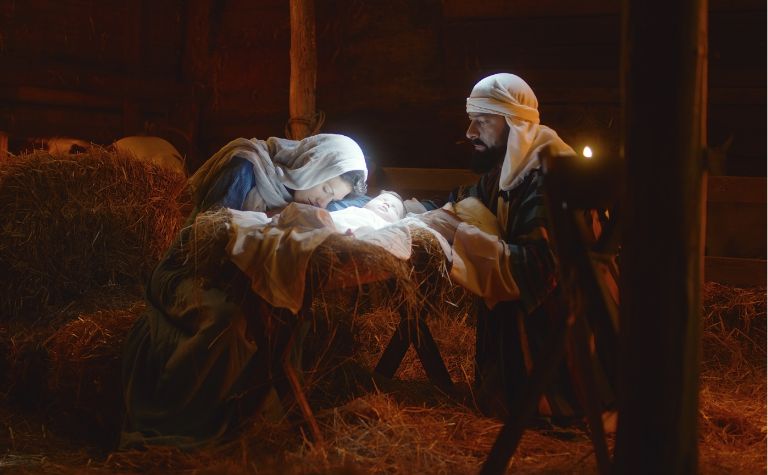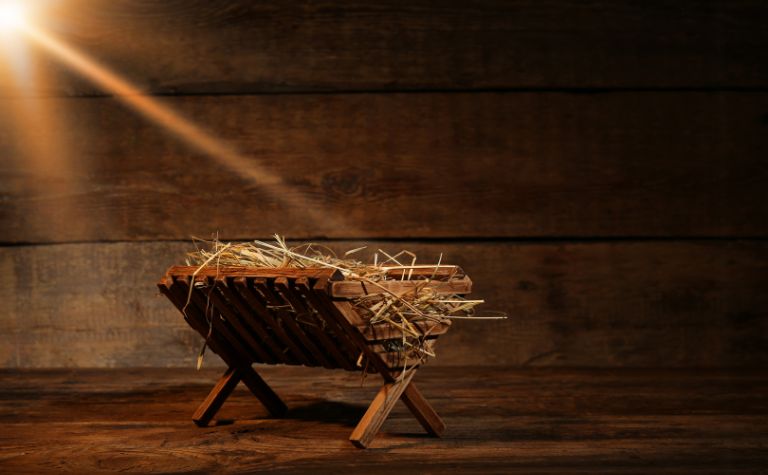The New Testament of the Bible offers a treasure trove of narratives, accounts, and lessons.
One of its four Gospels, Matthew, presents a detailed and unique perspective on the early life of Jesus, particularly concerning His birth and childhood.
Here’s an exploration of eleven key facts about Jesus’ birth, as detailed by Matthew.

1. The Genealogy
Matthew’s account begins with a meticulously crafted lineage that traces Jesus’ ancestry back to Abraham.
This genealogy not only positions Jesus in a historical context but also underscores His rightful place in the line of David, a vital requirement for the Messiah.
Notable figures pepper this lineage, including David, Solomon, and other significant patriarchs, marking Jesus as a descendant of both kings and priests.
2. Joseph’s Dream
Joseph, betrothed to Mary, is faced with a predicament when he discovers she’s pregnant.
Before he can take any action, an angel appears to him in a dream.
The angel reassures Joseph, explaining that Mary’s conception is by the Holy Spirit and that the child will save people from their sins.
This divine dream prompts Joseph to stand by Mary and accept the forthcoming birth with grace.

3. Birth in Bethlehem
While the exact circumstances of their journey aren’t described, Mary and Joseph are in Bethlehem at the time of Jesus’ birth, fulfilling the prophecy of the Messiah being born in this little town.
This detail, seemingly simple, has profound implications, aligning Jesus’ birth with centuries-old predictions.
4. Visit of the Magi (Wise Men)
Following Jesus’ birth, Magi from the East arrive in Jerusalem, guided by a star.
These learned men, possibly astrologers, seek the “King of the Jews,” showcasing that the news of this monumental birth wasn’t confined to Judea but had reverberations far and wide.
5. King Herod’s Concern
The reigning king, Herod, is deeply troubled when he hears about another potential “King.”
Intent on safeguarding his throne, Herod covertly meets the Magi, trying to extract information about this newborn.
He feigns interest in paying homage and asks them to report back once they find the child.

6. The Star’s Guidance
The Magi continue their journey, with the star leading them directly to Jesus. This celestial guide reaffirms the divine nature of Jesus’ birth.
Upon reaching Jesus, they present Him with gifts of gold, frankincense, and myrrh.
Each of these gifts bears symbolic importance, signifying Jesus’ kingship, divinity, and eventual sacrifice.
7. The Flight to Egypt
After their visit, the Magi are divinely warned in a dream not to return to Herod.
Similarly, an angel instructs Joseph to flee to Egypt with Mary and Jesus, citing impending danger from Herod.
This swift nocturnal departure emphasizes the tangible threats Jesus faced even as an infant.
8. Herod’s Massacre
Realizing that the Magi won’t return, Herod’s insecurity turns to rage.
He orders a heart-wrenching decree: the killing of all male children aged two and under in Bethlehem and its districts.
This horrific act, rooted in political paranoia, casts a somber shadow over the joyous event of Jesus’ birth.
9. Return from Egypt
After Herod’s death, an angel appears to Joseph in another dream, signifying that returning to Israel is safe.
However, hearing that Herod’s son, Archelaus, reigns in Judea, Joseph is cautious. He opts for a life in the quieter town of Nazareth in the region of Galilee.
This decision is, in itself, a fulfillment of prophecies, as Jesus would be called a Nazarene.
10. Prophecies Fulfilled
Matthew’s Gospel frequently cites Old Testament prophecies to illustrate the divine orchestration of events.
Whether it’s the birth in Bethlehem, the escape to Egypt, or life in Nazareth, each event aligns with predictions made centuries earlier.
These fulfillments bolster the assertion that Jesus’ life was unfolding precisely as foretold.
Comparing Jesus’ Birth Stories in Luke and Matthew
| Luke’s Gospel | Matthew’s Gospel | |
|---|---|---|
| Annunciation | Angel Gabriel appears to Mary. | Angel appears to Joseph in a dream. |
| Genealogy | Traces Jesus’ lineage through David’s son Nathan back to Adam. | Traces lineage through David’s son Solomon to Abraham. |
| Place of Birth | Bethlehem | Bethlehem |
| Reason for Bethlehem | Caesar Augustus’ census leads Joseph and Mary to Bethlehem. | No mention of a census; Joseph and Mary are seemingly already in Bethlehem. |
| Birth Details | Jesus is born in a stable and placed in a manger due to no room in the inn. | Details of Jesus’ birth setting are not provided. |
| Visitors at Birth | Shepherds, informed by angels. | Wise men (Magi) from the East following a star. |
| King’s Reaction | No mention of King Herod’s reaction. | King Herod feels threatened and orders the massacre of all male infants in Bethlehem. |
| Prophecies | Simeon and Anna prophesy about Jesus at the Temple. | Prophecies are cited to explain events, like why Jesus was born in Bethlehem. |
| Flight to Egypt | No mention of a flight to Egypt. | Joseph is warned in a dream to flee to Egypt with Mary and Jesus to escape Herod’s massacre. |
| Return from Egypt | No mention of a flight to Egypt. | After Herod’s death, an angel tells Joseph it’s safe to return, but they settle in Nazareth to avoid Herod’s son. |
| Early Childhood | Jesus is presented at the Temple. He grows up in Nazareth, displaying wisdom even as a child. | After returning from Egypt, the family settles in Nazareth. There’s limited detail about Jesus’ childhood. |
Conclusion
Matthew’s account of Jesus’ birth paints a vivid picture, intertwined with dreams, prophecies, and celestial events.
From a guiding star to dire warnings, from lavish gifts to an escape in the night, the narrative is as gripping as it is profound.
Beyond the historical and prophetic validations, this Gospel highlights a simple yet monumental truth: the birth of Jesus was a pivotal moment, not just in the annals of history but in the overarching narrative of humanity.
Related Questions
Joseph, the husband of Mary and the earthly father of Jesus Christ, is depicted in the Gospels as humble, law-abiding, and obedient. In many Christmas scenes, such as in displays of the manger, he is...
The virgin Mary, the mother of Jesus, is one of the most fascinating people in the Bible. For 2,000 years, people of different eras and cultures have marveled at her faith in God. Mary's story in the...
